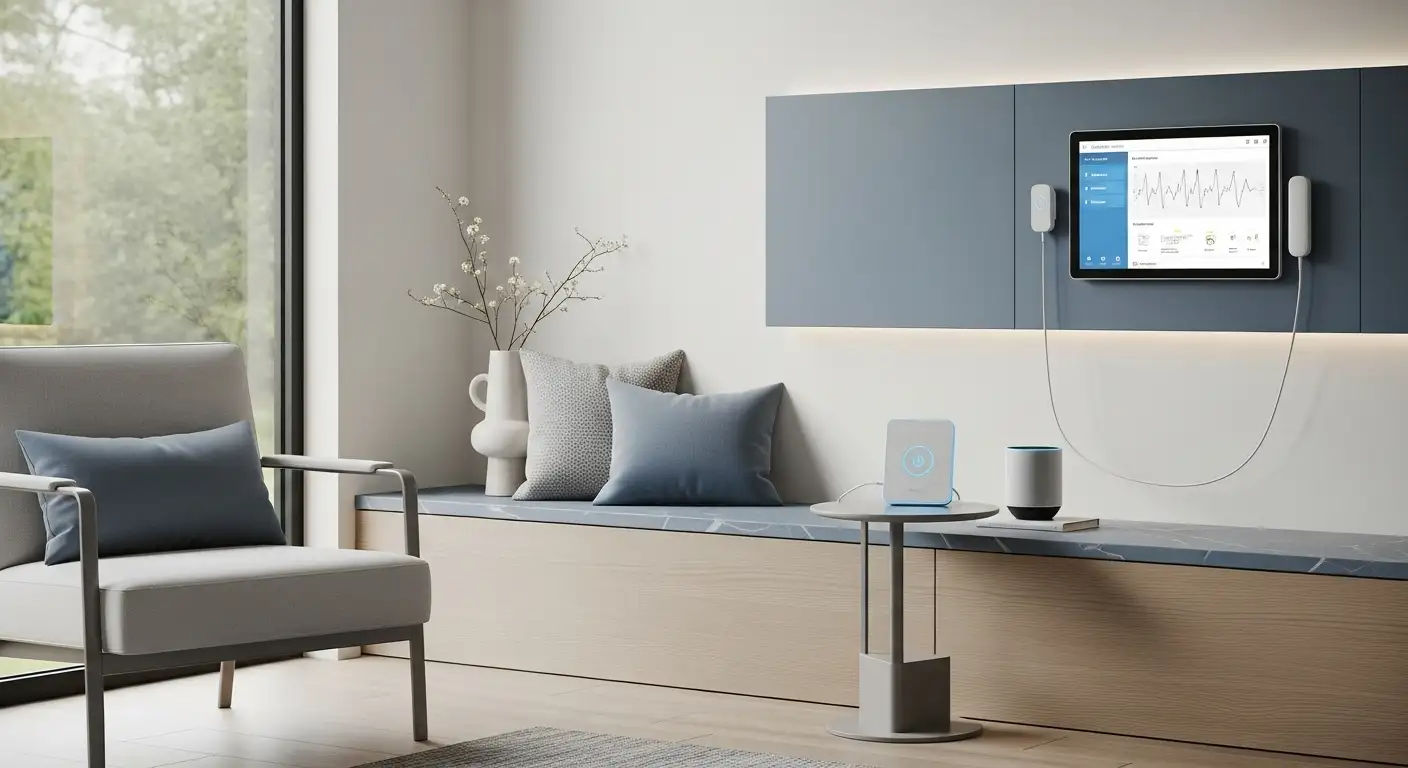Virtual Health Services in Concierge Home Care
In the realm of concierge home care, virtual health services have emerged as a powerful tool to enhance patient care and support. These services provide a range of benefits that encompass enhancing patient communication and providing immediate assistance.

Enhancing Patient Communication
Virtual health services in concierge home care enable patients and their families to connect with the care team immediately, 24/7, for urgent needs or questions. This level of accessibility enhances patient-monitoring capabilities and allows for prompt responses to concerns or inquiries. With the ability to connect virtually, patients can receive guidance, advice, and reassurance from healthcare professionals, even without an in-person visit. This immediate communication helps foster a sense of security and trust between patients and their care team.
Providing Immediate Assistance
Virtual health services play a crucial role in providing immediate access for urgent needs or questions, which is particularly beneficial for high-risk patients and seniors lacking consistent caregiver support. By leveraging telehealth technologies, patients can receive timely assistance and medical advice without the need for in-person visits. This virtual support ensures that patients can receive the necessary care and attention when they need it most, even in emergency situations.
The integration of technology in concierge home care has revolutionized patient care, offering personalized care, increased accessibility, and improved outcomes. Remote monitoring systems track vital signs in real-time, providing valuable insights for high-quality care and proactive health monitoring. Telehealth services allow for diagnosis, treatment, and monitoring without the need for in-person appointments, enhancing convenience and accessibility [2]. These virtual health services ensure that patients receive comprehensive and timely care, even from the comfort of their own homes.
As technology continues to advance, virtual health services will continue to play an integral role in concierge home care, offering innovative solutions to enhance patient care, improve communication, and provide immediate support. The combination of virtual care services and personalized attention from concierge home care providers creates a powerful synergy that enhances the overall quality of care for patients and their families.
Benefits of Virtual Care for High-Risk Patients
Virtual care services play a vital role in concierge home care, especially for high-risk patients. These services provide numerous benefits, including increased oversight and monitoring, as well as addressing caregiver support gaps.
Increased Oversight and Monitoring
Virtual care services, offered by Concierge Home Care, utilize technology to enhance communication and oversight for high-risk patients and seniors lacking consistent caregiver support [1]. Through virtual nursing, virtual physical therapy, virtual occupational therapy, and additional virtual resources, patients receive personalized care remotely.
By leveraging technology, virtual care programs enable healthcare professionals to monitor patients more closely. The scope of the virtual care program offered depends on the severity of the patient's condition and their access to technology. Regular virtual check-ins and remote monitoring allow healthcare providers to assess the patient's progress, address any concerns promptly, and make necessary adjustments to the care plan.
The ability to remotely monitor vital signs, such as blood pressure, heart rate, and oxygen levels, provides valuable insights into a patient's health status. This continuous oversight helps identify potential health issues early on, allowing for timely intervention and reducing the risk of complications. Studies have shown that virtual care programs, like those offered by Concierge Home Care, can significantly reduce hospital readmissions [3].
Addressing Caregiver Support Gaps
For high-risk patients and seniors who lack consistent caregiver support, virtual care services fill an essential gap in ensuring their well-being. These services provide an extra layer of communication and support, even when physical assistance may not be readily available. Through virtual interactions, patients can connect with healthcare professionals, ask questions, and receive guidance on managing their health conditions.
Virtual care programs not only benefit patients but also provide support for caregivers. Caregivers may face challenges in providing round-the-clock care, and virtual care services offer additional resources and assistance. Caregivers can rely on virtual check-ins and consultations to seek guidance, ask questions, and access educational materials.
By addressing caregiver support gaps, virtual care services contribute to the overall well-being of high-risk patients. These services offer peace of mind to both patients and their caregivers, knowing that professional support is just a virtual connection away.
The benefits of virtual care extend beyond increased oversight and addressing caregiver support gaps. To learn more about the comprehensive care provided by concierge home care, continue reading our article on Comprehensive Care in Concierge Home Care.

Concierge Home Care Membership
When considering concierge home care, it's essential to understand the cost considerations and coverage involved in the membership. Concierge medicine often involves a membership fee that provides patients with personalized care and direct access to healthcare providers. The cost of membership can vary significantly depending on the level of service and the specific concierge practice.
Cost Considerations
Membership fees for concierge home care can range from $2,000 to $50,000 annually, depending on the scope of services provided and the location of the practice. The fee covers personalized care and the convenience of direct access to healthcare professionals. It's important to note that this fee typically does not cover additional expenses such as specialist visits, prescriptions, or hospital stays. These services may incur additional out-of-pocket costs for the patient [4].
To get a clear understanding of the costs involved, individuals considering concierge home care should inquire about the specific services included in the membership fee and any potential additional expenses that may arise. This transparency can help patients make informed decisions about their financial commitments and ensure they are receiving the level of care they desire.
Coverage and Additional Expenses
Concierge home care membership generally covers personalized care plans and direct access to healthcare providers. However, it's important to clarify the extent of coverage provided by the membership. Some concierge practices may have partnerships with specialists or offer legal consultation services or concierge medicine partnerships.
While the membership fee covers many services, there may still be external services that require traditional insurance coverage. Transparency in insurance billing can be a challenge in concierge medicine, which has led some practices to avoid traditional insurance and opt for a model where care is covered under a flat membership fee. However, certain services may still require traditional insurance, limiting patient options and potentially leading to additional expenses. Understanding the coverage and potential additional expenses associated with external services is crucial for individuals considering concierge home care.
It's important to note that availability can be a challenge when seeking concierge home care. Finding a practice with open slots for new patients can be difficult, especially in less urbanized areas where concierge options may be limited or non-existent. Patients may need to join waiting lists until a spot becomes available [4]. Therefore, it's advisable to inquire about availability when considering a concierge home care membership.
When exploring concierge home care options, it's essential to evaluate the cost considerations, coverage, and potential additional expenses associated with the membership. Transparency in pricing and services can help individuals make informed decisions about their healthcare choices and ensure they receive the comprehensive care they are seeking.

Challenges in Traditional Concierge Medicine
While concierge medicine offers personalized and enhanced healthcare services, there are some challenges that can arise within this model. Two key challenges include insurance billing transparency and limited availability for new patients.
Insurance Billing Transparency
Transparency in insurance billing can be a challenge in traditional concierge medicine. Many concierge practices opt for a model where care is covered under a flat membership fee, which allows for enhanced services and more personalized care. However, this means that traditional insurance may not cover all services provided by the concierge practice.
Patients may find themselves in a situation where certain external services or treatments require traditional insurance coverage, thus limiting their options. It's important for patients to understand what services are covered by their membership fee and what services may require additional insurance coverage. This transparency can help patients make informed decisions about their healthcare and manage their financial responsibilities effectively.
Limited Availability for New Patients
Another challenge in traditional concierge medicine is the limited availability for new patients, especially in less urbanized areas where concierge options may be limited or non-existent. Due to the personalized nature of concierge medicine, practices often have a smaller patient panel, allowing for more focused and accessible care.
However, this limited availability can result in waiting lists for individuals seeking to become new patients. Patients may need to wait until a spot becomes available or explore alternative options for their healthcare needs. It is important for individuals interested in concierge medicine to research and inquire about the availability of practices in their area to ensure they can access the care they desire.
By understanding the challenges within traditional concierge medicine, patients and caregivers can make informed decisions about their healthcare options. It's important to consider these challenges alongside the benefits and advantages of concierge medicine to determine the most suitable approach for personalized and comprehensive care. For more information on coordinating medical appointments and working with family physicians in concierge home care, refer to our articles on coordinating medical appointments in concierge home care and coordination with family physicians in concierge home care.
Technology Integration in Aging in Place
As technology continues to advance, it has become an integral part of aging in place for seniors. The integration of technology in home care has brought about numerous benefits, including improved safety, convenience, and social connections. Two key aspects of technology integration in aging in place are smart devices for seniors and the facilitation of social connections through telehealth.
Smart Devices for Seniors
Smart devices have revolutionized the way seniors interact with their environment and access essential services. These devices include smartwatches, medication reminders, video doorbells, virtual assistants, and online grocery delivery services. By leveraging these technologies, seniors can enjoy a safer and more convenient lifestyle, enhancing their overall quality of life.
Smartwatches, for example, offer features like fall detection and heart rate monitoring, providing peace of mind for both seniors and their caregivers. Medication reminders ensure that seniors take their medications at the right time, reducing the risk of missed doses. Video doorbells allow seniors to see and communicate with visitors remotely, enhancing security and convenience. Virtual assistants, such as voice-controlled devices, can help seniors with tasks like setting reminders, playing music, or even ordering groceries online. These devices empower seniors to maintain their independence while staying connected to the world around them.
Social Connections and Telehealth
Social connections play a vital role in the well-being of seniors, and technology has made it easier for them to maintain these connections. Video conferencing platforms and social media allow seniors to connect with friends and family regardless of distance. This not only helps combat feelings of isolation but also facilitates access to telehealth services for remote consultations with healthcare professionals [5].
Telehealth services enable seniors to receive medical advice, monitoring, and even certain treatments from the comfort of their own homes. Through video calls or virtual appointments, seniors can consult with healthcare providers, reducing the need for in-person visits. This is particularly beneficial for seniors with limited mobility or those living in remote areas. The integration of technology in telehealth expands access to healthcare services, providing seniors with the care they need, when they need it.
The integration of smart devices and telehealth services demonstrates the commitment of concierge home care providers to enhancing the quality of life for seniors. By adopting these technologies, providers like the LiveWell program are able to provide comprehensive, professional care while promoting independence and well-being [5]. Seniors can age in place comfortably, knowing that they have access to personalized care and the support they need to maintain an active and fulfilling lifestyle.
In the next section, we will explore the comprehensive care provided by concierge home care, including personalized care plans and support for daily living.
Comprehensive Care in Concierge Home Care
When it comes to concierge home care, comprehensive care is at the forefront. This specialized service aims to enhance the quality of life for seniors by prioritizing personalized care plans and adopting a multi-disciplinary approach to meet the unique needs of each individual. By addressing the physical, emotional, and social well-being of seniors, concierge home care promotes overall well-being and independence.
Personalized Care Plans
One of the key advantages of concierge home care is the focus on personalized care plans. These plans are tailored to the specific needs, preferences, and goals of each senior. By taking into account factors such as medical conditions, mobility limitations, and personal preferences, caregivers can develop a comprehensive care plan that addresses all aspects of an individual's well-being.
Personalized care plans often include assistance with daily living activities, medication management, mobility support, companionship, and coordination of medical appointments and treatments. By considering the unique needs of each senior, these plans ensure that all aspects of their care are taken into account, promoting overall well-being and independence [5].
Support for Daily Living
Concierge home care goes beyond medical assistance and extends support for daily living activities. Caregivers are trained to provide assistance with tasks such as bathing, grooming, dressing, meal preparation, and housekeeping. These services aim to enhance the quality of life for seniors by enabling them to maintain their independence and continue living in the comfort of their own homes.
In addition to physical support, concierge home care also addresses the emotional and social well-being of seniors. Caregivers provide companionship, emotional support, and personalized care to alleviate feelings of loneliness and anxiety. The presence of caregivers around the clock fosters a sense of security and peace of mind, contributing to positive mental states and overall well-being [6].
By providing comprehensive support for daily living, concierge home care ensures that seniors receive the assistance they need while maintaining their dignity and independence. This approach to care promotes a higher quality of life and allows seniors to age in place comfortably.
In conclusion, comprehensive care in concierge home care consists of personalized care plans that are tailored to the unique needs of each individual. This approach encompasses not only medical assistance but also support for daily living activities, companionship, and emotional well-being. By prioritizing comprehensive care, concierge home care enhances the overall well-being and independence of seniors, enabling them to age in place with dignity and comfort.
References
- https://conciergehomecare.com/services/virtual-care
- https://www.parxhhc.com/resources/virtual-health-services-in-concierge-home-care
- https://www.healthrecoverysolutions.com/resources/remote-patient-monitoring-case-study/concierge-home-care
- https://worldclinic.com/blog/problems-with-concierge-medicine
- https://www.h2hhc.com/blog/seniors-concierge-home-care-enhances
- https://www.parxhhc.com/resources/benefits-of-24-7-concierge-home-care



